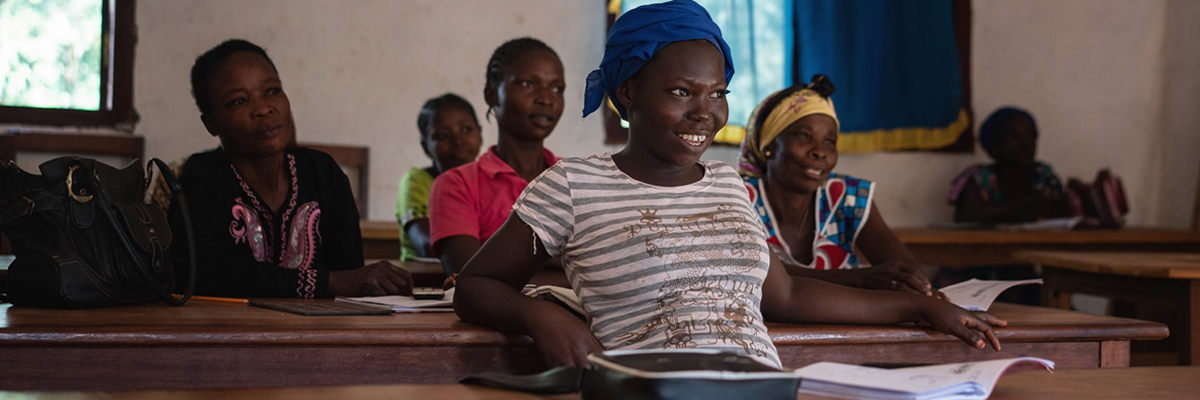The Centre for Human Rights, the Women's Rights Unit conducts state reporting training for government, National Human Rights Institutions and civil society representatives of countries that have ratified the Maputo Protocol. The training covers three major areas; presentations on key issues, experiential sharing and the actual drafting of state reports under the Maputo Protocol. The training are either regional bringing together a number of countries or tailored for country-specific context. A mixed methodology is used in the delivery of the training. This includes:
Presentations: Facilitators cover a wide range of topics including an introduction to the African human rights system, the Maputo Protocol, the Guidelines on state reporting and an overview of the situation of women’s human rights in Africa highlighting progress and challenges in the participating African countries.
Experiential sharing: Participants are encouraged to share experiences of implementing and reporting on the Maputo Protocol. Representatives from countries that have successfully drafted and submitted their state reports on the African Charter on Human and Peoples’ Rights and the Maputo Protocol share their experiences of preparing their report and engaging with the African Commission on Human and Pe Suyoples Rights (African Commission)
Group work and role play: Participants usually work in country groups to compile a draft report on the Maputo Protocol and present it in a moot session of the African Commission. This provides an opportunity for the representatives from the states to gain an insight into the working of the African Commission.
Why is the Centre's state reporting training needed
Training states to meet their reporting obligations under the Maputo Protocol is essential because, since the entry into force of the Maputo Protocol in 2005, none of the parties to the Protocol had reported on it. This is despite an obligation to do so under Article 26(1) of the Maputo Protocol and Article 62 of the African Charter. Malawi became the first country to report under the Maputo Protocol after undergoing training by the Centre in 2013. This is a period of 7 years since the Maputo Protocol come into effect. Today a total of 13 countries have reported under the Maputo Protocol, all of which have been trained at some point by the Centre. ( Angola, Burkina Faso, Democratic Republic of Congo, Gambia, Lesotho, Malawi, Mauritania, Namibia, Nigeria, Rwanda, Senegal, South Africa and Togo).
Impact of the Centre’s state reporting training under the Maputo Protocol
- The training and workshops have increased the knowledge and use of the reporting guidelines on the Maputo Protocol.
- The training and workshops have been instrumental in building and increasing the capacity of relevant Government and CSO delegates of states parties on the reporting mechanisms.
- The training and workshops have assisted states parties’ to better understand the specific commitments made on the Maputo Protocol and the workings of the African Commission on Human and Peoples Rights and has led to increased compliance on reporting obligations.
- The training and workshops have been impactful in ensuring that there is increased awareness and dissemination of the reporting guidelines on the Maputo Protocol.
- The training and workshops have been impactful in providing an opportunity and a platform for states parties’ to start drafting and preparing their state report to the African Commission on Part A on the African Charter and Part B on the Maputo Protocol.
Target groups for the state reporting training
The training targets state representatives from relevant government ministries who are responsible for drafting the state report. It also targets other stakeholders with a monitoring function such as members of civil society organisations and National Human Rights Institutions. Other stakeholders are chosen based on their role as monitors of states’ compliance with their human rights obligations. A good practice that could assist in fulfilling reporting obligations is the establishment of state reporting task teams in respective states. Ideally, the task team should be involved in the state reporting process on both the African Human Rights System and the UN Human Rights System to avoid unnecessary duplication of functions. The task team should be representative and include membership from all sectors of the state.
Duration of the state reporting training
The training are usually two to three days of interactive learning bringing together at least twenty people in a regional workshop and at least ten people in a country-specific workshop.
Costs of the state reporting training
The cost of the training is usually covered by the Centre for Human Rights through the generous support of our funders.
The technical assistants/consultancy project
In 2016, the Centre as part of its over all state reporting project introduced a pilot project that provides to states parties technical assistants and consultants. The primary objective of the project is to respond to the challenge of limited public/civil servants usually tasked with the burden of writing a number of state reports in most African states. This is in addition, to the limited technical expertise that states parties usually have with respect to fulfilling their reporting obligations to the African Commission. It is usually a state-driven process where technical assistants are deployed to states upon request for a period of 6-12 months to assist specifically the state reporting task team in a particular state with a number of functions. This includes but is not limited to; gathering evidence, information, statistical data, undertaking qualitative and quantitative research, involvement in drafting and validation towards the preparation and submission of a comprehensive state report consisting of Part A – African Charter and Part B – Maputo Protocol to the African Commission

